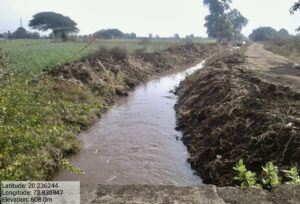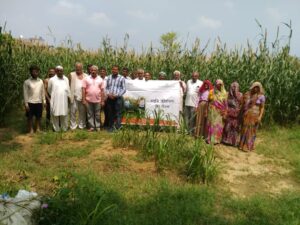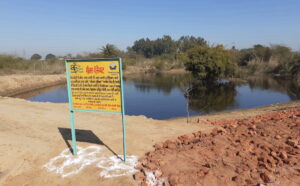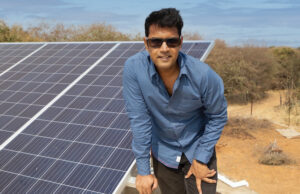A country blessed with an abundance of water resources and large rivers is currently facing the terrifying possibility of becoming a water-scarce country by 2025. That is the dichotomy facing India today. Understanding this, Pernod Ricard India has consistently pursued the goal of managing water systems for long-term sustainability with agile demand management, mitigating wasteful use, and leveraging holistic watershed-level conservation efforts. As a resource and as a key ingredient, water is used at every stage of Pernod Ricard products’ life cycle through integrating water stewardship into a circular model. This approach is crucial not just for safeguarding the planet’s finite water resources but also for ensuring long-term business sustainability.
Over time, Pernod Ricard has emerged as a sustainable and responsible organisation that aims to create shared value for local communities, through conservation and sustainable practices including management of natural resources, reducing land degradation and biodiversity loss, and protecting and restoring one of the most important natural resources, water. This will help us institutionalise socioeconomic benefits to communities and integrate a new business model that is inclusive and relevant to both a changing world and the company’s business strategies.
Becoming water-positive
In 2019, Pernod Ricard India recharged 1.2 times more groundwater than it withdrew for business operations, thus becoming a net water-positive company. Owing to continuous structured efforts in conserving water within its fence and creating abundance beyond it, the company created a water recharge potential of 900 million litres against a total consumption of 759 million litres. The strategy driving this is aligned with the UN Sustainable Development Goals (SDGs), specifically SDG 6″‘providing clean water and sanitation’ and SGD 15″‘life on land’.
Within the fence
Water-efficient business operations: Pernod Ricard India’s water stewardship programme is strongly aligned with the 4R principles: reduce, reuse, recycle, and recharge. To define a strong baseline for targeted interventions, the company has mapped the local water stress (total water withdrawals: available renewable surface and groundwater supplies) at all its manufacturing and bottling locations with the help of Global Water Risk Atlas and India Water Tool. This has helped in strategising already ongoing initiatives to minimise water use with robust manufacturing processes.
Our sustained investment in monitoring wastewater and effluent treatment is aimed at enhancing the availability of potable water. Focussed on boosting water-use efficiency in our operations through a combination of continuous improvement, operational efficiency and cultural change aimed at conserving and reusing water wherever possible, we have seen a 54% decrease in total water consumption intensity since 2015.
Beyond the fence
Community-driven watershed management: Conscious of the fact that our impact on water extends beyond the fence, we continuously engage with more than 100,000 community members near our operations in seven states as part of our WAL (Water, Agriculture, Livelihoods) programme. The programme currently encompasses 11 key projects and aims to foster water resilience by replenishing surface and ground water for ensuring year-round availability through groundwater recharge and surface storage, while promoting water-efficient agriculture, sustainable production, and natural-resource management, and augmenting livelihoods for 30,000 smallholder and women farmers over a period of three years.
In the tribal precincts of Dindori, Pernod Ricard India Foundation in partnership with Action for Food Production (AFPRO) has been working to enhance knowledge sharing and skills for better water augmentation and artificial recharge, sustainable agriculture, and livelihood development. Construction of 11 ponds and 17 check dams as well as desiltation and renovation of 47 recharge tanks have added a total water potential of 180 million litres and have been positively impacting the lives of 12,300 tribal farmers. Renovation of a 16-km-long stretch of the local water canal has brought 250 hectares of farmland under irrigation, at the same time reducing the explicit dependency of communities on groundwater.

Renovation of this irrigation canal has brought 250 hectares of farmland under irrigation. Thirteen water budgeting and water resource mapping exercises have also been conducted in the area to promote demand-side management practices.
Behror, Rajasthan
In this deeply water-stressed region, Pernod Ricard India Foundation touches the lives of 8,000 farmers with Project Samridhi, in partnership with SM Sehgal Foundation. As of today, 3 surface storage ponds, 1 earthen check dam and 12 recharge wells for groundwater recharge, along with 14 soak wells for wastewater recharge, have created a total water potential of 58 million litres. Installation of 20 drip-and-sprinkler systems in the semi-arid region of Behror have demonstrated a 40% decrease in water use for irrigation. Laser land-levelling exercises have further reaped 25% water savings, with a 10% yield increase in local wheat crop.

In Behror, 17 Farmer Field days organised as part of Project Samridhi helped farmers see the difference between traditional methods and advanced methods to save water with micro-irrigation, better soil health management, and cropping practices.
In the agri-heartland of the country, Project Srijal with Sir Syed Trust supports 9,000 local community members with construction of 4 earthen dams, desiltation of 6 ponds, and installation of 3 recharge wells, adding a total water potential of 44 million litres. Demonstration of a system of rice and wheat intensification has helped marginal farmers in scaling up their production by 20% while effectively decreasing water use. These efforts have been further supplemented with local awareness programmes on water conservation in partnership with the state agriculture department.
Grassroots-level programme implementation can never reap tangible multidimensional impact without participation and ownership of the communities it serves. Community engagement does not merely ensure the sustainability and longevity of interventions, it also helps deliver impact to all households and livelihood and social groups. Across all projects and initiatives in the WAL programme, Pernod Ricard India Foundation has engaged with communities by forming 204+ key institutions such as gram sangathans, kisan gosthis, self-help groups, producer groups and jal panchayats.

Surface water savings are gauged with the help of an earthen dam constructed as part of Project Srijal in Derabassi. These earthen dams have also supported the livelihoods of women’s self-help groups (SHGs) formed as part of the project – they were involved in creation and reinforcement of these structures.
Empowering small and marginal farmers through agri-innovations
Owning less than two hectares of land which is often fragmented means that a vast number of farmers belonging to underprivileged and tribal communities are unable to earn sustained incomes from their own lands. Marginal farmers are an important cohort for the WAL programme, and in geographies such as Shivpuri, Nashik and Derabassi, they are the core beneficiary group for the programme.
In Shivpuri, Project Vikalp with Self Reliant Initiatives through Joint Action (SRIJAN) deploys a unique model of nano-orchard horticulture on ancestral plots owned by tribal women farmers in the region. Approximately 60 saplings of fruiting trees such as guava are lined on a 540 sq. metre plot, where farmers also have the opportunity to sow petty crops which can either be used for consumption or sold locally. Currently, 29 nano-orchard plots are providing year-round returns for subsistence as well as a sustained increase of about Rs 30,000 in disposable incomes as the saplings mature and bear fruit. Also, 24 small landholdings are being turned into vegetable plots for local commodity crops in Derabassi, with low-cost kitchen gardening and organo-practices.
We share a world of finite resources, now under huge pressure. The only way forward is to remain focussed on circularity and aim to minimise waste at every step by imagining, producing and distributing our products in ways that help preserve natural resources. As co-partners with communities, we not only need to rebuild, we need to rebuild better and foster resilience.

Sashidhar Vempala heads CSR, sustainability and communications at Pernod Ricard India. Deeply passionate about shaping organisational sustainability cultures and systems, community-centred development, and social impact business storytelling, he comes with 20+ years of experience of working at reputed organisations like Ogilvy, Tata Teleservices, and Nokia. When not working, he can be easily found in one of India’s many national parks working to empower forest guards, mitigate negative human”wildlife interactions, and documenting stories of coexistence.
